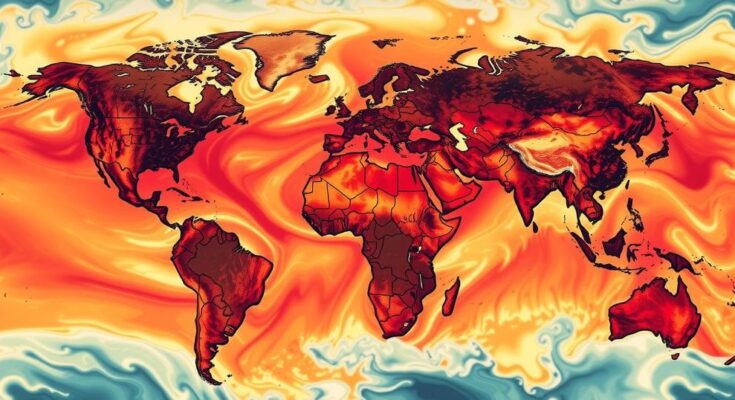Climate change contributed to an average of 41 additional days of dangerous heat globally in 2024, marking the year as potentially the hottest on record. Researchers linked 26 out of 29 extreme weather events to climate change, affecting millions worldwide, especially in developing countries. Urgent action is needed to mitigate these effects and prepare for future challenges.
In 2024, the phenomenon of climate change resulted in an average of 41 additional days of hazardous heat around the world, as reported by scientists from World Weather Attribution and Climate Central. This alarming finding arrives at a time when the planet continues to shatter record temperatures, with predictions indicating that 2024 could be the hottest year on record. Extreme weather events linked to climate change have led to devastating impacts globally, affecting the lives of millions.
Lead researcher Friederike Otto expressed the urgency of the situation, noting, “The finding is devastating but utterly unsurprising: Climate change did play a role, and often a major role in most of the events we studied…” The report emphasizes that the ongoing reliance on fossil fuels will exacerbate these dire conditions.
Across the globe, regions suffered from extreme heat. For instance, Northern California and Death Valley experienced oppressive heat, while soaring temperatures in southern Europe prompted Greece to shut down the Acropolis. Additionally, children in vulnerable areas, such as West Africa, were endangered due to the extreme climatic conditions. The analysis highlighted that certain areas experienced more than 150 days of severe heat, disproportionately impacting less developed nations.
The research team utilized a method comparing actual global temperatures in 2024 to hypothetical scenarios without climate change. Although the findings have yet to undergo peer review, they follow established scientific methodologies. Kristina Dahl from Climate Central remarked on the academic framework, stressing the heightened danger faced by developing regions.
The effects of heat-related illnesses and fatalities often remain unreported, complicating awareness and response efforts. “People don’t have to die in heat waves. But if we can’t communicate convincingly, ‘but actually a lot of people are dying,’ it’s much harder to raise this awareness,” underscored Otto.
The study examined 29 extreme weather events, which resulted in over 3,700 deaths and the displacement of millions, with 26 of these events having evident ties to climate change. The researchers also noted the influence of the El Niño weather pattern in intensifying these occurrences; however, they asserted that climate change had a more significant impact overall.
As the planet approaches the critical limit defined in the Paris Agreement of 1.5 degrees Celsius above pre-industrial levels, the findings are proving increasingly concerning. Jennifer Francis, a climate scientist, stated, “Extreme weather will continue to become more frequent, intense, destructive, costly, and deadly…”
The United Nations Environment Programme has cautioned against the continuation of fossil fuel usage, suggesting that without intervention, extreme climate events will worsen. However, Julie Arrighi from the Red Cross expressed hope, stating, “Countries can reduce those impacts by preparing for climate change and adapting for climate change…”
While the outlook remains daunting, the need for action and adaptation strategies is more crucial than ever in mitigating the repercussions of climate change and safeguarding vulnerable populations.
Climate change has emerged as a significant global challenge, with researchers continually investigating its impacts on weather patterns and extreme events. In recent years, scientists have documented a rise in hazardous heat days and severe weather phenomena, often linking these changes directly to human activities, particularly the combustion of fossil fuels. Understanding these dynamics is essential for policymakers and communities as they work toward strategies for mitigation and adaptation in response to climate change.
In conclusion, the findings from the research indicate that climate change continues to exacerbate extreme weather conditions globally, resulting in unprecedented heat waves and severe weather events in 2024. These changes have serious implications for public health, particularly in vulnerable populations. Addressing climate change through concerted global efforts and meaningful policy interventions is imperative to reduce future impacts, safeguard lives, and comply with international climate agreements.
Original Source: www.detroitnews.com




